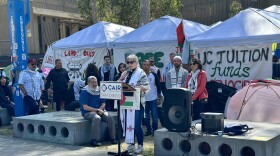San Diego economists run the gamut on their predictions of the post-pandemic economic recovery, with some saying it will be a long protracted struggle, and others predicting it will go quicker than anticipated.
More bullish than most is Alan Nevin, director of economic research with Xpera Group, a construction and real estate consultancy.
"The vast majority of economists feel it is necessary to take a doomsday view because they don't think there is any benefit to them projecting anything positive, and they all hopped on the negative bandwagon. I'm not one of them," Nevin said.
"The reality is small businesses opening now are finding a great enthusiasm. Hairstylists, particularly women, are overwhelmed. Small restaurants seem to have done well with take-out, and restaurants with outdoor patio seating have done especially well," he said.
RELATED: It’s Official: U.S. Economy Is In A Recession
Gary London of London Moeder Advisors, serving clients that include developers, investors, public agencies and litigators, was less optimistic, likening the developing economic recovery more to a bear re-emerging from hibernation.
"It's going to be a very slow transition back," London cautioned. "People will be scared and wary following the pandemic. That translates into less business for restaurants, hotels, attractions, etcetera. I think that is our reality for the balance of this year."
Bob Rauch of RAR Hospitality, a hotelier with more than four decades of hospitality-related management experience, is downright bearish about that hard-hit economic sector and its prospects for a quick turnabout.
"The outlook is not a rosy picture for a number of reasons," said Rauch, who characterizes the pandemic-induced status quo in the industry now as "a complete disaster."
Rauch said, "Hotel occupancy is usually about 80% in April, May and June, and up to 90% in July and August. But with no conventions and no large corporate groups this year, hotel occupancy was about 20% in April, about 30% in May, and may be up to 40% in June. And we're assuming it will be about half of normal the rest of the year."
Nevin defended his economic optimism turning the corner into summer.
"You have 25 million people within two hours drive of San Diego County and they want to go to the beaches," he said. "Our traditional hotels, not those that are convention-oriented, will do very well. The big guys downtown who rely on conventions will not do well."
RELATED: Here We Go Again: Millennials Are Staring At Yet Another Recession
Nevin believes the reopenings of major local theme parks will prove vital to improving tourism numbers.
"Once Legoland, the San Diego Zoo, SeaWorld and other attractions reopen, that will resuscitate the tourism business in the third quarter," he said.
London disagrees.
"Anybody who suggests there is going to be a quick, classic, V-shaped recovery: they're mistaken," he said. "It's just not possible."
London believes a COVID-19 vaccine is the one thing that would signal an economic recovery from the pandemic.
"The milestone event will be when a vaccine is developed, distributed, and the majority of the population is inoculated," he said. "That will be the moment when we can target some timeframe for a recovery, perhaps the beginning of next year."
Rauch pegs the chances of an economic rebound not to vaccine development, but rather to how strict -- or loose -- health restrictions imposed on the rebounding economy will be moving forward.
"If the governor is able to loosen up travel restrictions, I think this summer will be OK," he said. "But with hotel occupancy likely half of usual, room rates that usually cost up to $200 a night may not get much over $100. Only if leisure business is allowed could we have a reasonably decent summer. We have a market for people who can drive here. But air travel is not going to come back quite as quickly."
Nevin said the circumstances behind the current state of the economy defies comparisons to the 2008 recession.
"This COVID-induced economy has been a blue-collar recession, whereas the last one we had was construction and real estate related," he said. "Construction was deemed an essential industry. And, right now, contractors are really desperate for employees. They just cannot get them."





